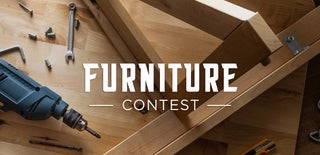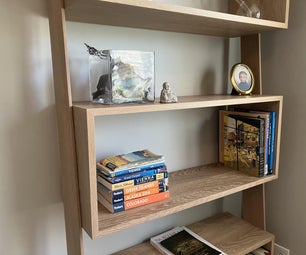Introduction: Classic Bookshelf With a Touch of Steampunk Style.
I had most of the materials just taking up space so I decided to make a little bookshelf to place next to my back door. I wanted to have locking doors at the bottom and a few open shelves. The top I decided to cut decorative trim pieces and add leather to the top to sit stuff on that I carry with me in my pockets. I also wanted to implement copper pieces I had saved from the home I grew up in which burned Dec 11th 1990. I ended up shaping them in a decorative fashion and recessing them into the sides of the shelf with aluminum sheeting underneath. Finding vintage USA hardware pieces ( Tote full of new in plastic pieces from the 60's or 70's ) really made it imo. My friend said it makes him think it looks steampunk.
Supplies
Various sizes of boards
Plywood
Sandpaper
Nails, screws, finishing nails, super glue, wood glue
Decorative hardware ( vintage hardware purchased at a flea market )
Piece of leather ( I used a leather skirt which I purchased at a vendors mall )
Brass key lock mechanism ( Lowes )
Half Gallon of paint
Aluminum sheeting
Step 1: Tools Used and Always Wear Safety Glasses!
Always wear safety glasses and hearing protectors. I cannot stress this enough.
Drill with various bits and drivers
Circular Saw
Jigsaw
Square, tape measure, pencil
Saw horses, C-clamps, Vise grips clamp
Gloves
Tin Snips
Scissors
Exacto knife
Hole cutting bit for keylock hole drilling
Step 2: Building the Basic Structure of the Shelf.
I had various spare lumber laying around leftover from other projects and from a disassembled theater room screen I built in 2005. I managed to make the best use I could from all the pieces I had and the shelf is 2' wide, 10" deep, and 4' tall. I used finishing nails on most of the project when are barely visible just giving a much neater overall look even after painting.
Step 3: Cutting the Bottom Doors and Fitting the Hinges.
For the bottom doors I got lucky by finding a good piece of 3/4" plywood which fit the door opening perfect. Basically all I had to do was make a cut down the center. Upon fitting them I used finishing nails to nail a top stop in the center so as I could line the doors up and mark where to drill the pilot holes for the hinge screws ( always do this to avoid splits ). I got the doors installed and made sure they opened and closed properly and then drilled the hole for the lock.
Step 4: Cutting the Top Decorative Trim Pieces and Drilling Holes for Hardware Center Piece.
I used jigsaw to cut out the top pieces from a pattern which I traced ( but made larger ) from one of the decorative hardware pieces. The top center decorative piece I had to drill 2 holes to secure it into. I then used 80 grit sandpaper to get all the edges smooth and free of splinters.I painted it with 2 coats of paint on 2 different days. The paint I used had primer and paint all in one but still required 2 coats.
Step 5: Adding Centerpiece Decorative Piece, Leather to the Top of Shelf, and the Backing.
These old hardware pieces I found for decoration really was a lucky find at the right time because had I not found them the shelf would have just been a plain shelf. I used super glue to hold the top leather piece in place and used exacto knife to trim it out after gluing it down. I also used leather on the top of the side and back top decorative wood pieces I cut. I used a piece of decorative slick grooved face material for the upper backing piece trimming it out at the top to further secure the upper decorative piece. I used screws to fasten it into place and the bottom door area I used plywood pieces and elmers glue since it's a locking compartment.
Step 6: Fitting the Aluminum Sheeting to the Side Recesses, Bending & Adding Decorative Copper Pieces.
I really wanted to do something different on the sides of the shelf so that's where the aluminum sheets and old house fire copper tubing came into play. I measured and shaped the aluminum sheeting to fit back into the recess sort of like a pocket. I used small brown square spiked tip nails to fasten the aluminum into place. I then measured the copper tubing and cut it to fit taking into account the coiling of the ends and wavy pattern. I drilled holes in the tubing into the ends of the center shelves and screwed the copper tubing into place very firmly which provided much more strength to the overall shelf. This shelf will be around a long long time because it's very sturdy built.
Step 7: Adding All the Final Decorative Hardware.
I had lots of pieces to choose from so it took a bit of thinking to figure out exactly what decorative piece I was going to place where. I'm happy with how it turned out.
Step 8: Putting the Shelf to Use.
As you can see I put this shelf to good use putting a lot of my books and magazines inside it. I like it much better than the old black press board shelf which was there before. Much better use of the space and looks better as well so a win win.

Participated in the
Furniture Contest













